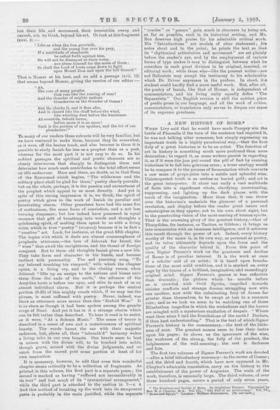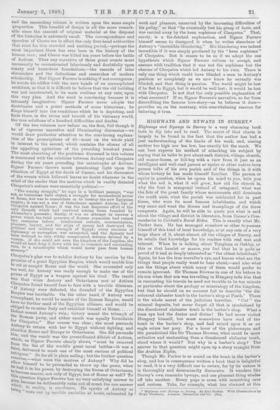A NEW HISTORY OF ROME.* WHEN Livy said that he
would have made Pompey win the battle of Pharsalia if the turn of the sentence bad required it, he was not talking utter nonsense, but simply expressing an important truth in a highly paradoxical way,--that the first duty of a great historian is to be an artist. The function of art in history is something much more profound than mere decoration; to regard it, as some writers persist in regarding it, as if it were the jam put round the pill of fact by Cunning historians is to fall into grievous error ; a truer analogy would be to compare it to the process of fermentation which converts a raw mass of grape-juice into a Subtle and splendid wine. Unintarpreted truth is as useless as buried gold; and art is the great interpreter. It alone can unify a vast multitude of facts into a significant whole, clarifying, accentuating, suppressing, and lighting up the dark places with the torch 'of the imagination. More than that, it can throw over the historian's materials the glamour of a personal revelation, and diSplay before the reader great issues and catastrophes as they appear, not to his own short sight, but to the penetrating vision of the most soaring of human spirits. That is' the crowning glory of the greatest history,—that of Tbucydides, for instance, or Tacitue, or Gibbon ; it brings us into communion with an immense intelligence, end it achieves this result through the power of art. Indeed, every history worthy of the name is, in its own way, as personal as poetry, and its value ultimately depends upon the force and the quality of the character behind it. From this point of view, Signor Ferrero's work on the greatness and decline of Rome is of peculiar interest. It is the work at once of a scholar and of an artist; it is based upon founda- tions of time most solid erudition, and it is Marked on every page by the traces of a brilliant, imaginative,ald exceedingly original mind. Signor Ferrero's geniue ii less reflective than dramatic ; the picture which he unrolls before us is crowded with vivid figures, ' impelled towards sinister conflicts and strange dooms, strugglifig now with one another, now with the culminating fury of forces far greater than themselves, to be swept at last to a common ruin ; and as we look we seem to be watching one of those Elizabethan tragedies in which the wickedness and the horror are mingled with a mysterious exaltation or despair. "Where west thou when I laid the foundations of the earth P Declare, if thou bast understanding." That is the text of which Signor Ferrero's history is the commentary,—the text of the little- ness of man. The greatest names seem to lose their lustre upon his pages; he shows us the ignorance of the wise, the weakness of the strong, the folly of the prudent, the helplessness of the well-meaning; the rest is darkness and fate.
The first two volumes of, Signor Ferrero's, work are devoted —after a brief introductory summary—to the career of Caesar; and the third and fourth, 'which have now appeared in Mr. Chaytoes admirable translation, carry on the history to the establishment of the power of Augustus. The scale of the work, therefore, is unusually large. The third volume, of over three hundred. pages, covers a period of only seven years, Tho Greatness and &eine of Rome. By Guglielmo Ferrero. Translated by Rev. H. J. Chaytor, NA. Vol. III., "The Pall of an Aristocracy." Vol. IV., Acme and Egypt." London, William Heinemann. net each..1 and the succeeding volume is written upon the same ample proportion. This breadth of design is all the more remark- able since the amount of original material at the disposal a the historian is extremely small. The correspondence and speeches of Cicero are in effect the only first-hand authorities that exist for this crowded and exciting period,—perhaps the most important there has ever been in the history of the human race; and Cicero was killed ten years before the battle of Actium. Thus any narrative of these great events must necessarily be reconstructed laboriously and doubtfully upon scanty and hazardous foundations,—the reeords of later chroniclers and the deductions and researches of modern scholarship. But Signor Ferrero is nothing if not courageous ; he erects Lis edifice with the sure hands of an accomplished architect, so that it is difficult to believe that the old building was not constructed, in its main outlines at any rate, upon this very plan. And the work is convincing because it is intensely imaginative. Signor Ferrero never adopts the doctrinaire and a priori methods of some historians ; he flings himself into the conditions which he is depicting, and finds there, in the stress and tumult of his visionary world, the true solutions of a hundred difficulties and doubts.
Of the two volumes now before us, the first, full though it be of vigorous narrative and illuminating discussion—we would draw particular attention to the convincing explana- tion of the proscriptions of 43—must on the whole yield in interest to the second, which contains the alimax of all the appalling agitations of the preceding hundred years. The most absorbing of the problems discussed in this volume is concerned with the relations between Antony and Cleopatra during the six years preceding the catastrophe at Actium. Signor Ferrero throws much penetrating light upon the situation of Egypt at the death of Caesar, and his discussion of the events which followed leaves no doubt whatever in the mind of the reader that the motives which in reality dictated Cleopatra's actions were essentially political
"The coming struggle," he says in a brilliant passage, "was not, as historians have stated, a struggle for monarchical power at Rome, but was to consolidate or to destroy the new Egyptian empire; it was not a war of Oetavianus against Antony, but of Cleopatra against Rome; it was the last desperate effort of the only dynasty which had survived among those founded by Alexander's generals ; finally, it was RII attempt to recover a Power which the fatal pressure of Roman expansion had ruined two centuries before. Intellectual culture, commercialism, Pleasure, luxury, and the reign of money had destroyed the Political and military strength of Egypt ; every resource of diplomacy or corruption was exhausted, and the dynasty had been reduced to this wildly complicated defence devised by a woman. If she could not save the kingdom of the Lagidae, she Would at least drag it down with her to romantic and resounding ruin, to a catastrophe which would never pass from human memory."
Cleopatra's plan was to subdue Antony to her service by the promise of a great Egyptian Empire, which would enable him to set at naught Rome and the world. She succeeded only too well, for Antony was ready enough to make use of the P°Iver of Egypt as a weapon against his rival. The result Was that when Antony and Octavianus met at Actium Cleopatra found herself face to face with a terrible dilemma. If Antony were defeated, the downfall of the Egyptian 1111p1re was inevitable. On the other band, if Antony were triumphant, he would be master of the Roman Empire, would have no further need of the Egyptian alliance, and would be Obliged to re-enter Italy and establish himself at Rome D. efeat meant Antony's ruin; victory meant the triumph of t.he Roman party, and either result was equally formidable lor Cleopatra." Her course was clear ; she must persuade 2t-nt?ay to return with her to Egypt without fighting, and sab.andon Rome and Europe to Octavianus. She did persuade and the result was the premeditated debdcle of Actium, w_ hich, as Signor Ferrero clearly shows, "must be removed om the list of the world's great naval battles—it was a felat, delivered to mask one of the most curious of political intrigues." So far all is plain sailing; but the further question remains,—what were the motives of Antony P Why did he allow himself to be persuaded to throw up the game, When he bad it in his power, by destroying the forces of Octavianus, t4„.beaome master, not only of Egypt, but of Rome as well P To gi "Ise question SignorTerrero has no very satisfying answer to
• because be deliberately rules out of court the one answer which, in reality, is conclusive. He speaks of Antony as bein g worn out by terrible anxieties at borne, exhausted by work and pleasure, unnerved by the increasing difficulties of his policy," so that "he eventually lost his grasp of facts, and was carried away by the keen sophisms of Cleopatra." That, surely, is a far-fetched explanation, and Signor Ferrero himself seems to disregard it when he writes elsewhere of Antony's "incredible blundering." His blundering was indeed incredible if it was simply produced by the "keen sophisms" of Cleopatra. But it ceases to be so if we adopt the one hypothesis which Signor Ferraro refuses to accept, and assume with tradition that it was not the sophisms but the charms of Cleopatra which led Antony to his ruin. There is only one think which could have blinded a man in Antony's position so completely as we now know ho actually was blinded, and that thing is passion. The world might be lost if he fled to Egypt, but it would be well lost; it would be lost with Cleopatra. Is not that the only possible explanation of what occurred ? If so, Signor Ferrero's narrative, so far from discrediting the famous love-story—as he believes it does— provides us, on the contrary, with overwhelming reasons for believing it true.













































 Previous page
Previous page